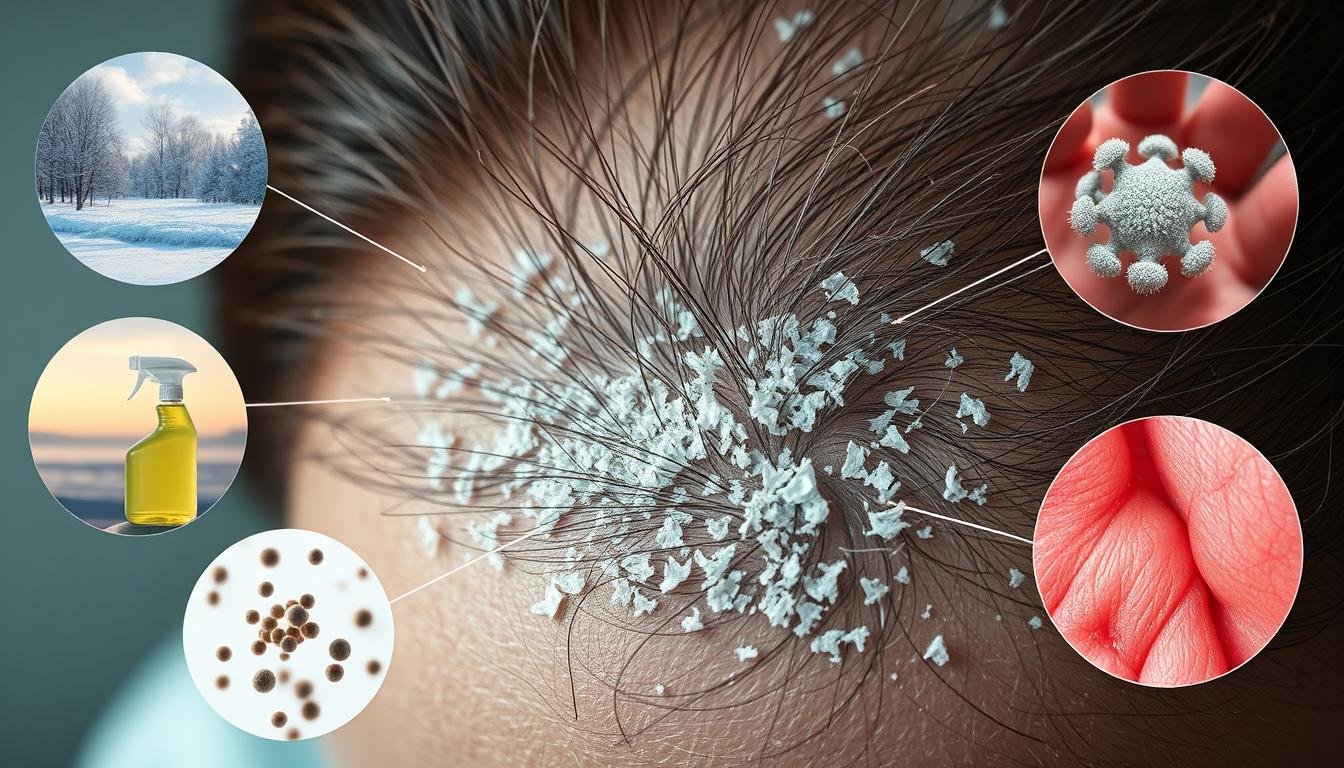What Causes Dandruff and Flaky Scalp? – Guide to Relief
Did you know that dandruff affects a staggering half of the global adult population? This surprisingly common scalp condition is often associated with seborrheic dermatitis, a skin irritation that leads to dry, flaky skin on the scalp. But what exactly causes this persistent problem, and how can you find lasting relief? Prepare to uncover the root causes of dandruff and learn effective strategies to combat those pesky white flakes for good.
Key Takeaways
- Dandruff is a widespread issue, impacting about 50% of the adult population worldwide.
- Certain medical conditions like Parkinson’s disease and weakened immune systems increase the risk of developing dandruff.
- Malassezia, a yeast-like fungus, is a primary culprit behind dandruff.
- Dry skin, oily Scalp, and sensitivity to hair care products are common contributors to flaky Scalp.
- Dandruff tends to worsen during the colder, drier fall and winter months.
Understanding Dandruff: An Overview
Dandruff is a common Scalp condition that affects millions of people worldwide. It is a mild form of seborrheic dermatitis, a skin condition characterized by the flaking of the Scalp. While not contagious or serious, dandruff can be a source of embarrassment and discomfort for those who experience it.
What is Dandruff?
Dandruff is the result of an overgrowth of a naturally occurring fungus called Malassezia on the Scalp. This fungus feeds on the oils secreted by the Scalp, leading to an inflammatory response that causes the skin to flake off. Dandruff can manifest as visible white or yellowish flakes on the scalp, hair, eyebrows, beard, mustache, and shoulders.
Common Symptoms of Dandruff
The primary symptoms of dandruff include:
- Visible flakes or scales on the scalp, hair, eyebrows, beard, mustache, and shoulders
- an itchy and irritated scalp
- In infants, a scaly, crusty scalp condition known as cradle cap
Factors such as stress, cold and dry weather, and certain hair care products can exacerbate these symptoms. While dandruff is not typically a serious condition, persistent cases may require the attention of a dermatologist.
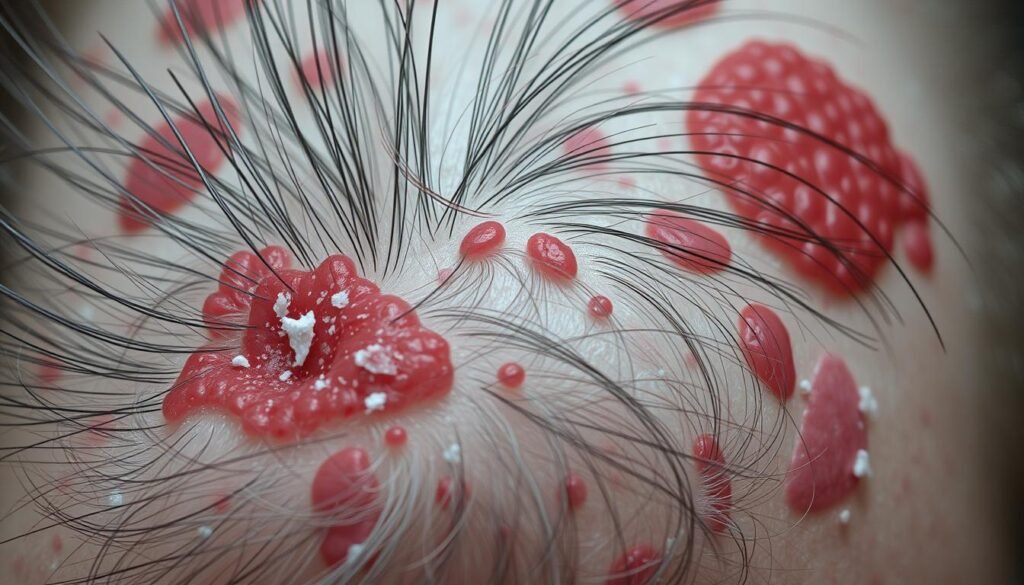
“Dandruff is a common, chronic condition that can be managed with the right treatment, but it’s important to understand the underlying causes and symptoms to find the Best solution.”
The Biological Causes of Dandruff
Dandruff, a common scalp condition, has its roots in both fungal infection and disruptions to the skin cell renewal cycle. At the heart of this issue is the Malassezia yeast, a primary culprit in the development of dandruff.
Malassezia Yeast: The Primary Culprit
Malassezia, a yeast-like fungus, is present on the scalps of most adults. This fungus feeds on the oils naturally found on the scalp, potentially irritating the skin and triggering an excess production of skin cells. As a result, the dead skin cells accumulate and become visible as flaky white or yellow particles – the telltale signs of dandruff.
Skin Cell Renewal Cycle
The skin cell renewal cycle also plays a crucial role in the development of dandruff. When this process is disrupted, it can lead to an imbalance in the rate of skin cell growth and shedding. Factors like oily skin, dry skin, and sensitivity to hair care products can contribute to this disruption, causing the skin cells to accumulate and form visible flakes on the scalp.
Interestingly, research suggests that certain dietary deficiencies, such as a lack of zinc, B vitamins, and gamma-linolenic acid, may also impact the skin cell renewal cycle and exacerbate dandruff. Maintaining a balanced and nutrient-rich diet can help support overall scalp health and reduce the risk of developing persistent flakiness.
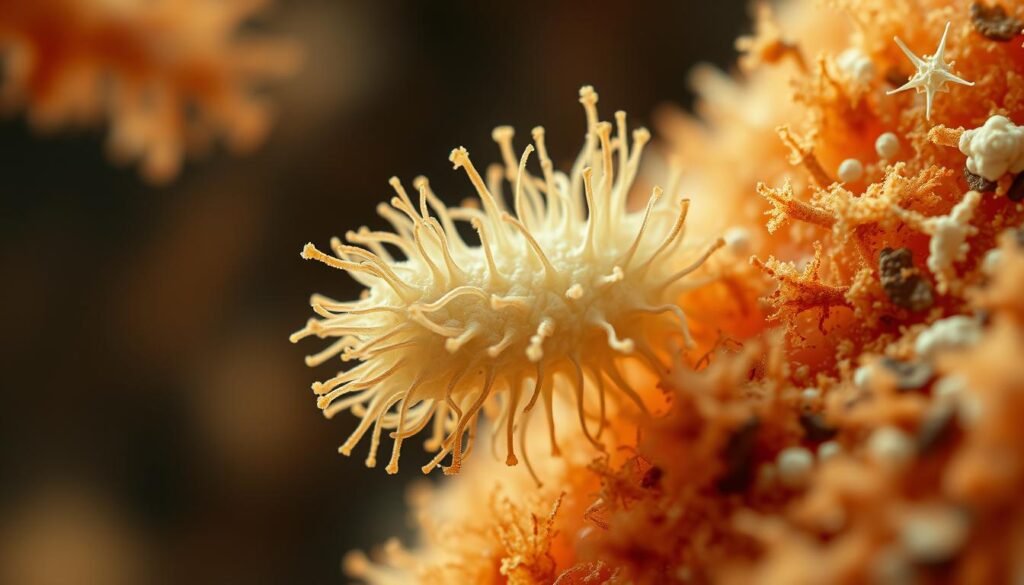
“Dandruff affects approximately 50% of the general adult population worldwide, with a higher prevalence in males than females.”
| Statistic | Value |
|---|---|
| Dandruff prevalence in African Americans | 81-95% |
| Dandruff prevalence in Caucasians | 66-82% |
| Dandruff prevalence in Chinese individuals | 30-42% |
| Annual spending on over-the-counter dandruff products in the US | $300 million |
Environmental Factors Leading to Flaky Scalp
The health of our scalp is greatly influenced by environmental factors. Seasonal changes and weather conditions can exacerbate dandruff symptoms, while exposure to air pollution can also impact scalp well-being.
Seasonal Changes and Weather Conditions
Dandruff often flares up during cold, dry weather. Low humidity levels can lead to a dry scalp, increasing flakiness and discomfort. Conversely, the fresh air of warmer seasons can help reduce oil buildup on the scalp, providing some relief. Protecting the scalp from harsh environmental conditions, such as using a wide-brimmed hat for sun protection, can help mitigate these effects.
Impact of Pollution on Scalp Health
Urban environments with high levels of air pollution can also contribute to scalp irritation and dandruff. Pollutants and dry climate can clog pores, leading to an imbalance in the scalp’s natural oil production and an overgrowth of the Malassezia yeast, a primary culprit behind dandruff. Incorporating scalp-soothing ingredients and regular cleansing routines can help protect the scalp from the damaging effects of humidity and pollution.

“Maintaining a healthy scalp is essential for preventing and managing dandruff, and understanding the role of environmental factors is crucial in this process.”
Dietary Influences on Dandruff
Your diet plays a crucial role in maintaining a healthy scalp and managing dandruff. Nutritional deficiencies can contribute to a dry, flaky scalp, making it more susceptible to the development of dandruff. Ensuring adequate intake of essential nutrients, such as B vitamins, zinc, and omega-3 fatty acids, may help alleviate this common condition.
Role of Nutritional Deficiencies
Studies have identified associations between low levels of specific nutrients and the severity of seborrheic dermatitis, a skin condition that can cause dandruff. Deficiencies in riboflavin (vitamin B2), niacin (vitamin B3), and pyridoxine (vitamin B6) have been linked to increased dandruff. Additionally, a lack of zinc and selenium can exacerbate flakiness and inflammation on the scalp.
Incorporating foods rich in these essential vitamins and minerals, such as lean meats, eggs, whole grains, seafood, and nuts, can help support overall scalp health and potentially reduce the appearance of dandruff.
Importance of Hydration for Scalp Health
Hydration is equally crucial for maintaining a healthy scalp. Insufficient fluid intake can lead to a dry, dehydrated scalp, making it more susceptible to flaking and the development of dandruff. Proper hydration helps maintain the skin’s moisture balance, which can be a key factor in managing dandruff symptoms.
Aim to drink plenty of water throughout the day and consider incorporating hydrating foods like fruits and vegetables into your diet. Staying well-hydrated can help keep your scalp supple and less prone to dryness and flakiness.
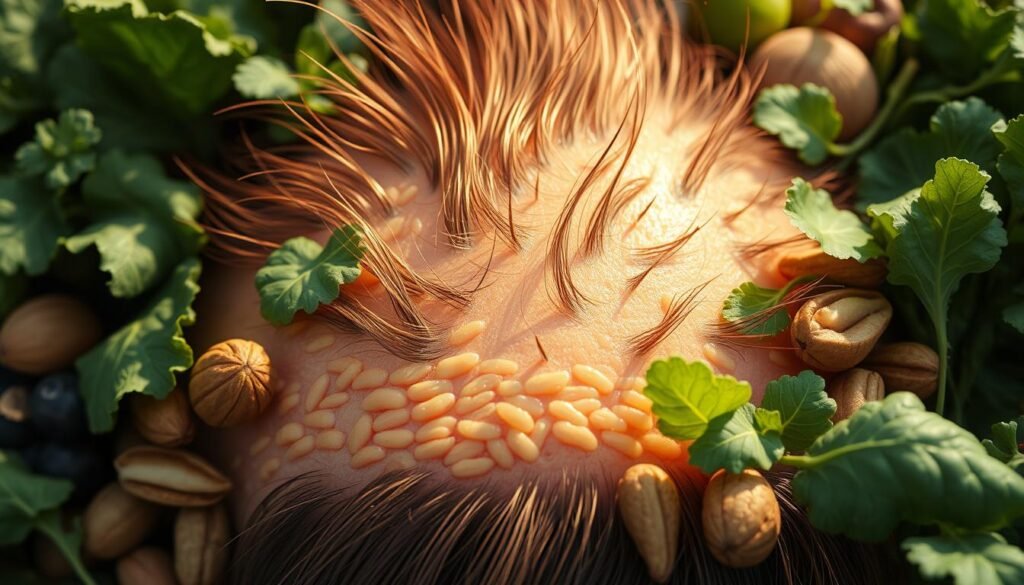
Remember, a balanced diet and adequate water intake are essential for promoting overall scalp health and potentially reducing the appearance of dandruff.
Scalp Conditions that Cause Flakiness
Dealing with a flaky scalp can be frustrating, but understanding the underlying causes is the first step towards finding relief. While dandruff is a common culprit, there are other scalp conditions that can also lead to flakiness and itching.
Seborrheic Dermatitis
Seborrheic dermatitis is a chronic skin condition closely related to dandruff. It is characterized by oily, yellow or white flakes, as well as redness and inflammation of the scalp. Unlike typical dandruff, seborrheic dermatitis is more severe and may require medical treatment.
Psoriasis vs. Dandruff: Key Differences
Psoriasis is another condition that can cause scalp flaking, but it differs from dandruff in several ways. While dandruff produces fine, white flakes, psoriasis typically causes thicker, silvery scales. Psoriasis also tends to affect other parts of the body, not just the scalp.
Another skin condition that can lead to a flaky scalp is eczema. Eczema can cause intense itching and scaling, often accompanied by redness and irritation.
| Condition | Flake Appearance | Associated Symptoms |
|---|---|---|
| Dandruff | Fine, white flakes | Mild itching, slight redness |
| Seborrheic Dermatitis | Oily, yellow or white flakes | Redness, inflammation, intense itching |
| Psoriasis | Thick, silvery scales | Scaling on other body parts, pain, inflammation |
| Eczema | Flaky, crusty patches | Severe itching, redness, irritation |
Understanding the differences between these scalp conditions is crucial for proper diagnosis and treatment. If you are experiencing persistent or severe scalp flakiness, it’s recommended to consult a dermatologist for a professional evaluation and personalized care.
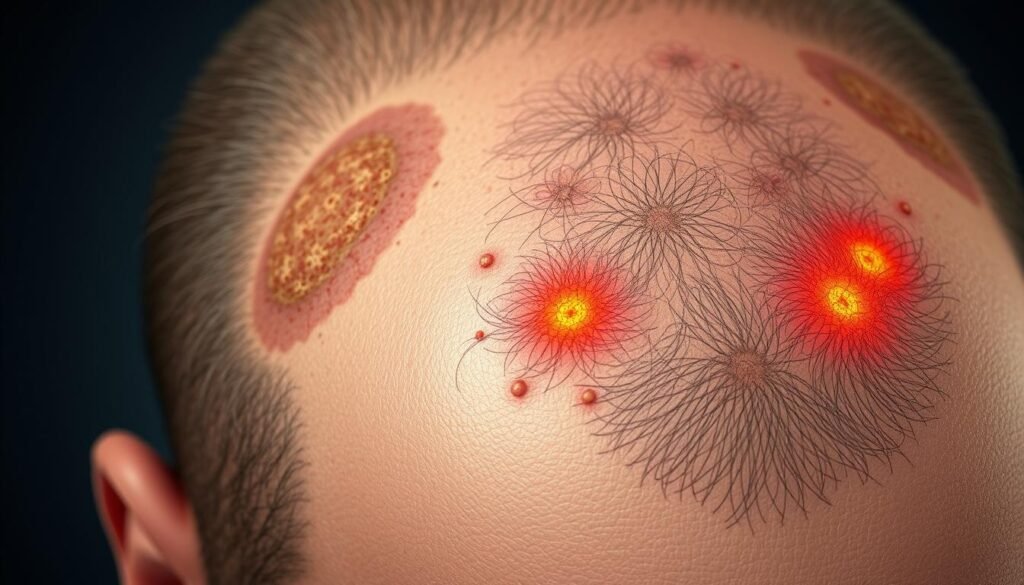
Hair Care Products and Dandruff
Selecting the right hair care products can make a significant difference in managing dandruff. The presence of sulfates in shampoos can be a contributing factor to dry, flaky scalp. Sulfates, commonly used as surfactants, can strip the scalp of its natural oils, exacerbating dryness and leading to an increased production of skin cells, resulting in visible dandruff flakes.
Sulfates and Their Effects on Scalp
To combat this issue, opting for sulfate-free shampoos can be a game-changer. These gentle formulas are designed to cleanse the scalp without disrupting its natural balance, helping to maintain a healthier environment for the scalp and hair.
Choosing the Right Shampoo and Conditioner
- Look for anti-dandruff products containing active ingredients like ketoconazole, selenium sulfide, or zinc pyrithione, which are known to be effective in controlling dandruff.
- Experiment with different gentle hair care products until you find the ones that work best for your specific hair and scalp type.
- Maintain a balanced washing routine, as both over-washing and under-washing can contribute to dandruff.
Finding the right shampoo and conditioner combination is crucial for managing dandruff. By addressing the underlying causes and choosing the appropriate sulfate-free shampoo, anti-dandruff products, and gentle hair care solutions, you can take a significant step towards achieving a healthy, flake-free scalp.

Lifestyle Factors Contributing to Dandruff
While dandruff may often be attributed to biological factors, our everyday lifestyle choices can play a significant role in its development and persistence. Two key lifestyle elements that can impact dandruff are stress management and sleep quality.
Stress and Its Impact on Skin Health
Chronic stress can take a toll on our overall health, including the health of our scalp. When we’re stressed, our body’s immune system can become compromised, making it easier for the Malassezia yeast to thrive and contribute to dandruff. Stress management techniques like yoga, meditation, or regular exercise can help mitigate this effect and support better scalp health.
Lack of Sleep: A Misunderstood Trigger
Another often overlooked factor in dandruff is the quality of our sleep. Inadequate sleep can disrupt the skin’s natural renewal process and affect immune function, potentially exacerbating dandruff symptoms. Maintaining a healthy sleep routine and getting enough rest can be crucial for managing a flaky scalp.
By addressing lifestyle factors like stress and sleep, individuals can take proactive steps to support their scalp health and reduce the occurrence of troublesome dandruff. Incorporating stress management techniques and prioritizing quality sleep can be valuable complementary approaches to a comprehensive dandruff management plan.

“Stress and lack of sleep can be significant contributors to dandruff, undermining the skin’s natural defenses and creating an environment where the Malassezia yeast can thrive.”
Natural Remedies for Dandruff Relief
Battling persistent dandruff can be a frustrating experience, but there are several natural remedies that may provide relief. From essential oils to everyday household items, these alternative solutions offer a gentler approach to managing this common scalp condition.
Essential Oils for Scalp Health
Essential oils like tea tree oil have gained popularity for their antifungal properties, which can help combat the Malassezia yeast that contributes to dandruff. Applying a few drops of tea tree oil directly to the scalp or incorporating it into a carrier oil, such as coconut oil, can soothe irritation and reduce flakiness.
Home Treatments: What Works?
Apple cider vinegar is a versatile natural remedy that can be used as a rinse after shampooing. The acidic nature of the vinegar helps restore the scalp’s pH balance and inhibit the growth of Malassezia. Other home treatments that may provide relief include baking soda scrubs, which can gently exfoliate the scalp, and aloe vera, which has soothing and hydrating properties.
It’s important to note that while these natural remedies may work for some individuals, the scientific evidence supporting their effectiveness is limited. Patch testing is recommended before trying any new product or treatment to ensure it doesn’t cause an allergic reaction.
| Natural Remedy | Potential Benefits |
|---|---|
| Tea Tree Oil | Antifungal properties that can combat Malassezia yeast |
| Coconut Oil | Moisturizing and anti-inflammatory properties |
| Apple Cider Vinegar | Restores scalp pH balance and inhibits Malassezia growth |
| Baking Soda | Gentle exfoliation to remove flaky skin |
| Aloe Vera | Soothing and hydrating properties for the scalp |
While natural remedies can be a helpful complement to traditional dandruff treatments, it’s essential to consult with a dermatologist if the condition persists or worsens. Professional guidance can ensure the proper diagnosis and management of any underlying scalp issues.
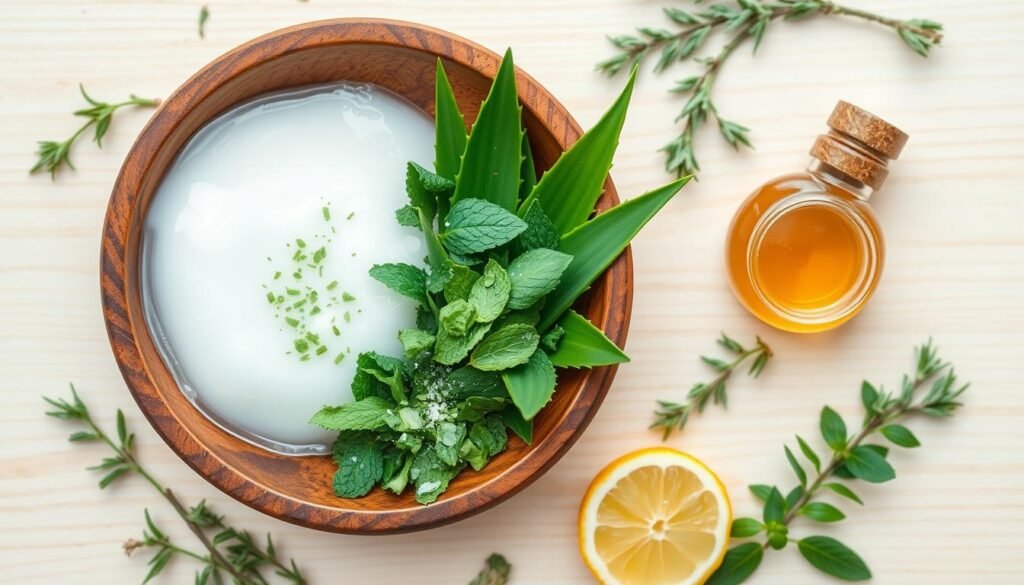
When to Seek Professional Help for Dandruff
While most cases of dandruff can be managed with over-the-counter products, some situations warrant professional medical attention. Signs indicating a need for dermatologist consultation include persistent dandruff despite consistent use of anti-dandruff shampoos, severe itching, redness or swelling of the scalp, and spreading of symptoms to the face or other body areas.
Signs That Indicate a Serious Condition
If dandruff symptoms persist or worsen despite regular use of medicated shampoos, it may be time to consult a dermatologist. Severe, recurring dandruff, accompanied by intense itching, redness, or scaling, could signify an underlying condition like seborrheic dermatitis or Psoriasis that requires specialized treatment.
Available Dermatological Treatments
Dermatologists can provide a thorough scalp examination and may prescribe stronger medicated shampoos or topical treatments to address the root cause of the issue. They can also diagnose and treat underlying conditions like severe seborrheic dermatitis or psoriasis that may be causing persistent scalp problems. With professional guidance, individuals can find the most effective solution for managing their dandruff and maintaining a healthy scalp.
FAQ
what is dandruff?
Dandruff is a common scalp condition that results in dry, flaky skin on the scalp. It is a mild form of seborrheic dermatitis, which can cause oily or dry flakes, itching, and irritated patches on the scalp.
What are the common symptoms of dandruff?
The main symptoms of dandruff include visible skin flakes on the scalp, hair, eyebrows, beard, mustache, and shoulders, as well as an itchy scalp. In infants, it may present as cradle cap with a scaly, crusty scalp.
What causes dandruff?
Dandruff is primarily caused by the Malassezia fungus, a yeast-like fungus that feeds on the oils on the scalps of most adults. This can irritate the scalp and cause excess skin cell growth, leading to the accumulation of dead skin cells and visible flakes.
How do environmental factors influence dandruff?
Environmental factors, such as seasonal changes in temperature and humidity, can significantly impact scalp health and contribute to dandruff. Cold, dry weather can exacerbate dandruff symptoms, while pollution in urban environments can also irritate the scalp and lead to dandruff.
What role does diet play in dandruff management?
Diet plays a crucial role in scalp health and dandruff management. Nutritional deficiencies, particularly in B vitamins, zinc, and omega-3 fatty acids, can contribute to a dry scalp and dandruff. Adequate hydration is also important for maintaining the skin’s moisture balance and reducing flakiness.
How are dandruff and other scalp conditions different?
Seborrheic dermatitis is a more severe form of scalp condition that can cause dandruff, while psoriasis typically produces thicker, silvery scales on the scalp. Eczema can also lead to scalp flaking and itching, but it differs in its presentation and treatment from dandruff.
How can hair care products affect dandruff?
Hair care products, especially those containing sulfates, can strip the scalp of its natural oils, leading to dryness and flaking. Choosing sulfate-free or gentle shampoos and finding the right balance in hair washing frequency can help manage dandruff effectively.
How do lifestyle factors contribute to dandruff?
Stress and lack of sleep can negatively impact the immune system, allowing the Malassezia fungus to thrive and exacerbate dandruff symptoms. Maintaining a healthy lifestyle with stress management techniques and adequate sleep can help mitigate these effects.
What natural remedies can help with dandruff?
Natural remedies like tea tree oil, apple cider vinegar, coconut oil, and baking soda scrubs may help alleviate dandruff symptoms, although their effectiveness lacks extensive scientific backing. It’s important to patch test before applying any new product to the scalp.
When should I see a dermatologist for dandruff?
You should consider seeking professional medical attention if your dandruff persists despite consistent use of over-the-counter anti-dandruff products, or if you experience severe itching, redness, swelling of the scalp, or spreading of symptoms to the face or other body areas. A dermatologist can provide a thorough scalp examination and prescribe stronger medicated treatments if necessary.
